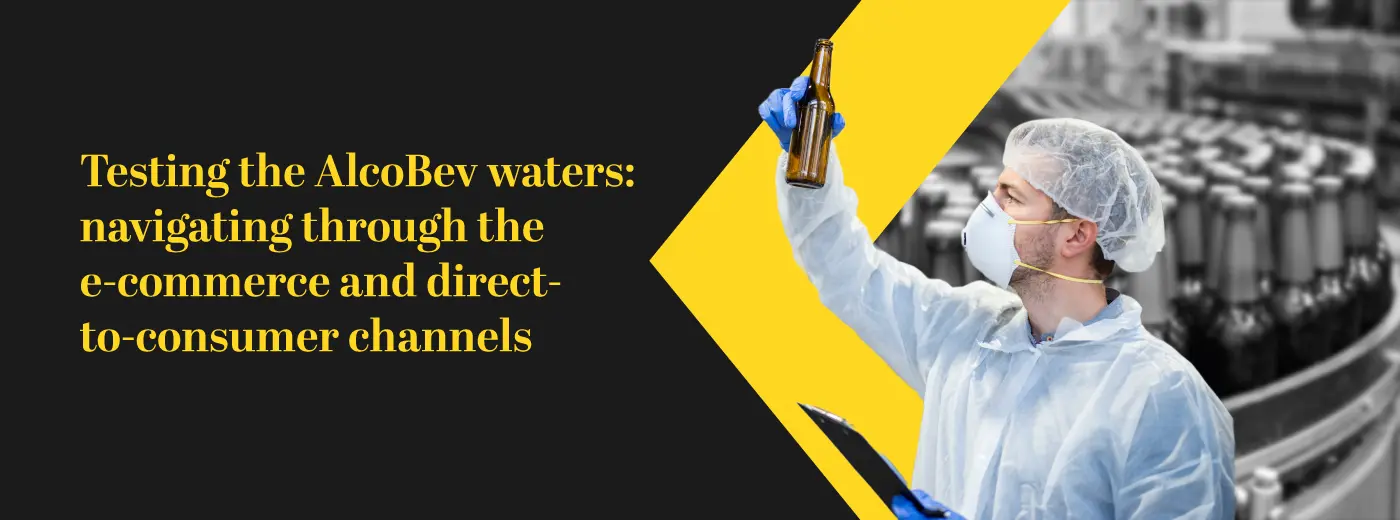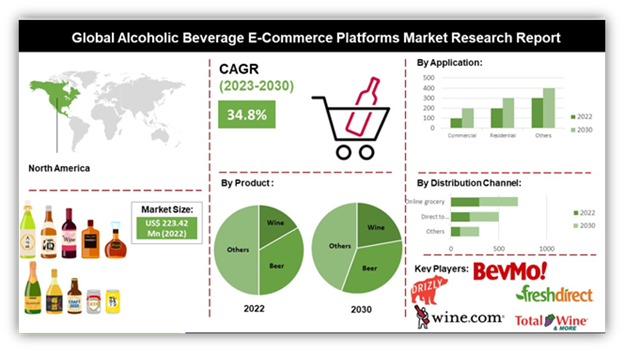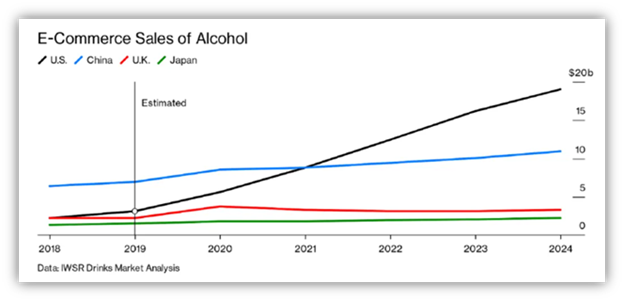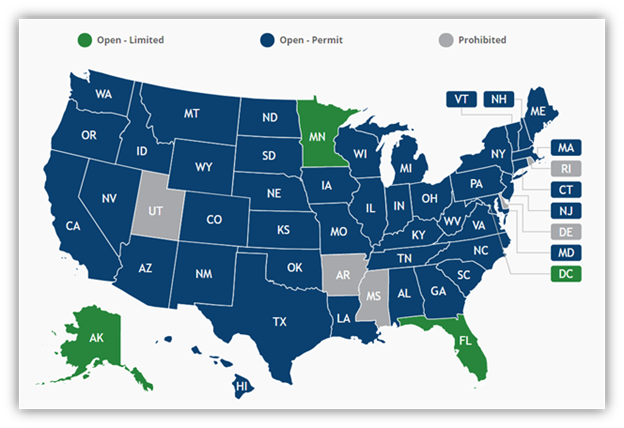
Sign up to receive latest insights & updates in technology, AI & data analytics, data science, & innovations from Polestar Analytics.
Editor's Note: We are pleased to present to you our latest blog post titled "Testing the AlcoBev Waters: Navigating through the E-Commerce and Direct-To-Consumer Channels." This insightful article delves into the intricacies of the Alcoholic Beverage Industry in the United States, offering invaluable guidance on harnessing the power of E-Commerce and Direct-To-Consumer channels for optimum success. Join us on this informative journey as we explore the vast potential of this industry and provide expert strategies for achieving growth and profitability.
The alcoholic beverage industry in the United States has dynamically transferred in the past few years owing to the shift in consumer buying patterns post covid and the intricate regulations and compliances. It encompasses the production, distribution, and sale of various alcoholic beverages, including beer, wine, spirits, and other alcoholic beverages. Industry plays a crucial role in the economy, generating substantial revenue, creating employment opportunities, and contributing to the tourism and hospitality sectors.
Traditionally, the industry relied heavily on the three-tier distribution system, consisting of producers, distributors, and retailers. However, with the rise of e-commerce and shifting consumer preferences, there has been a growing emphasis on exploring direct-to-consumer channels.

Covid-19 accelerated the digital transformation of business worldwide, according to the United Nations agency UNCTAD, which deals with trade and investment. UNCTAD calls the lockdown a "turning point" for e-commerce's share of global trade, which rose from 14% in 2019 to 17% in 2020. This trend is projected to continue.
Although the U.S. online liquor sales market is relatively highly regulated, 44% of American consumers began alcohol online for the first time during the pandemic, leading to a 42% growth in alcohol e-commerce in 2020. This means optimized e-commerce platforms have become crucial for business success and will remain so in the future.
Brands have done their utmost to get the go-ahead to use DTC shipping, especially with regards to the ability to sell over state lines. So far, there have been several victories: there are currently 14 states that allow inter-state DTC. This allows smaller brands to expand their reach and supply a larger consumer base than previously.
In February 2021, the alcohol e-commerce industry expanded when Uber bought Drizly, an app specifically designed for DTC sales. This development, among others, has been seen as a giant leap forward into a “new age” of alcohol distribution. One in which craft and artisanal brands can thrive instead of losing out to huge corporations.
| “In 2020, e-commerce and general technology adoption went from a progressive strategy to a business necessity.” – CEO, Drizly |

The alcoholic beverage industry is heavily regulated at both federal and state levels, leading to a complex and fragmented regulatory environment. Restrictions surrounding the sale, distribution, and shipment of alcohol vary across states, creating challenges for businesses trying to operate in the e-commerce and DTC space.
1. Regulatory Boundations: While many industries and individual businesses have suffered under the pandemic, a tax relief program–the Craft Beverage Modernization and Tax Reform Act–has allowed smaller distilleries to get a foot in the door.
Also, a reduction in the federal excise tax has given these emerging companies the chance to establish themselves without forking out millions of dollars before they’ve earned them. The lower tax also means less of a markup and the ability to price themselves competitively amongst other brands vying for consumer attention.
Fortunately, alcohol home delivery regulations in the U.S. are evolving to facilitate e-commerce. Forbes reports states relaxing direct shipping laws in the wake of the pandemic and increased consumer awareness of online sales options. Tech is already making innovations in this field, with apps and plugins for e-commerce stores that ensure full legal compliance and even calculate taxes when buying alcohol out of state.
A firm might have a variety of products like wine, beers, and spirits. It is important to know what could be sold online and which marketplaces allow online sales. By understanding the licensing in your locality and the markets you plan to sell, you can handpick your portfolio of products.
As of 2022, there were 8 states in the USA which still don’t allow delivery of alcohol. Understanding the shipping regulations of each of the states and the carriers you can choose to deliver alcohol to is important to stay compliant with the shipping rules. Currently, FedEx and UPS are the only approved national carriers for wine shipments.
Sellers are responsible for paying the taxes levied for alcohol, be it federal, state, or local taxes. Like shipping regulations, the taxes also differ from state to state. Due to this, often tax calculations can get complex as there are so many layers of tax regulations to consider. Using tools like Avalara to automate tax calculations can help you set the right price for the products you ship directly to consumers.
When the 21st Amendment passed and ended Prohibition in 1933, states were granted the power to enact their own laws regarding the production, distribution, and sale of alcohol.
Fast-forward to the 2005 Granholm v. Heald case in which the United States Supreme Court ruled that states must treat in-state and out-of-state businesses even-handedly. This caused most states to go back to the legislature and adopt or update DTC laws, creating additional complexity for DTC sellers.
2. Age Verification and Compliance: Selling alcohol online requires strict age verification processes to prevent underage purchases. Ensuring compliance with age restrictions and regulations across different jurisdictions poses a significant challenge for e-commerce platforms and DTC sellers.
3. Shipping and Logistics: Alcoholic beverages are subject to specific shipping and handling requirements due to their perishable nature and regulatory restrictions. Managing the logistics of shipping alcohol safely and efficiently can be challenging, particularly when navigating various state laws and compliance standards.
4. Consumer Education and Brand Building: In the traditional retail setting, consumers often rely on the expertise of sales representatives to make purchasing decisions. In the e-commerce and DTC channels, building brand awareness, educating consumers about different products, and providing a personalized experience become critical challenges.
Get access to advanced insights to master the E-Commerce and DTC channels in the AlcoBev industry. Stand out with superior analytics planning and better decision-making.
Click Here to Read The Case Study
Alcohol sale restrictions: State Wise, 2022
It’s clear that state and federal laws are still evolving, and those changes impact DTC sellers. Each state has different rules so it’s critical that firms keep up with changes and also explicitly understand the rules and comply with them individually.
Polestar Analytics, with its team of industry experts and Consultants – with expertise in the Alcoholic Beverages Industry provide actionable Data-driven insights to address the challenges faced by the in the e-commerce and DTC channels. Here's how data analytics can help:
1. Regulatory Compliance: By leveraging data analytics, Polestar Analytics can help businesses stay updated on the ever-changing regulations and compliance requirements across states. This enables them to ensure proper licensing, age verification, and adherence to shipping restrictions, minimizing the risk of non-compliance.
According to ShipCompliant by Sovos, after Covid, there were over 2,800 alcohol-related regulatory changes in the United States, highlighting the need for businesses to stay updated on evolving regulations.
2. Personalization and Consumer Insights: Polestar Analytics has proven expertise in Monitoring Marketing campaigns for businesses, enabling them to gather and analyze consumer data, such as purchasing behavior, preferences, and demographics. This information can be used to personalize marketing campaigns, recommend products based on consumer preferences, and enhance the overall customer experience.
A study by McKinsey found that companies that personalize their marketing messages and experiences based on consumer data can see revenue increases of 5% to 15%.
Wine.com, an online wine retailer, analyzes customer data to provide personalized recommendations based on individual preferences and purchase history.
3. Supply Chain Optimization: Polestar’s Supply chain analytics solutions help in Analyzing inventory management, demand forecasting, and logistics data can help optimize the supply chain. This enables businesses to streamline operations, reduce costs, and improve efficiency in fulfilling orders, including shipping alcoholic beverages safely and in compliance with regulations.
WineDirect, a wine fulfillment and e-commerce platform, uses data analytics to optimize inventory management and improve logistics, enabling wineries to fulfill orders efficiently and meet customer demands.
4. Marketing and Brand Building: Data analytics can provide valuable insights into consumer trends, market segmentation, and competitor analysis. This information can guide marketing strategies, allowing businesses to target specific consumer segments, tailor messaging, and create effective digital marketing campaigns to build brand awareness and loyalty.
Craft breweries like BrewDog leverage data analytics to identify consumer trends and preferences, enabling targeted marketing campaigns and the creation of innovative, niche products.
5. Innovations in Product Design and Strategy: By using survey analytics, businesses can determine varieties of products that are more appealing to each demographic, resulting in better recommendations and increasing average deal size. Businesses can achieve a first-mover advantage by coming up with innovative offerings and providing offers to increase market share.
6. Agile and Smart Pricing Strategy:Polestar specializes in providing Pricing solutions for consumer brands. Alcohol sales to both restaurants and bars are quite competitive. Specially curated promotional and pricing strategies are essential to provide a significant advantage over competitors.
With the help of point-of-sale data analytics, firms can understand what competitors are charging for alcoholic beverages. From this insight, it’s easy to develop a winning price.
Get in touch with our experts from AlcoBev industry and make your organization stay ahead of the competition
Get ConsultedStrategies like helping restaurants or bars set their prices would boost customer confidence – since most consumers have a perceived value solely based on the price attached to the brand. For instance, segmenting specific products to be highly-priced in comparison to others to portray exclusivity and value. You can also determine which products should be a more affordable choice as these will often be mid-priced.
Platforms like BevSpot help bars and restaurants optimize pricing strategies by providing data analytics on competitor pricing, sales trends, and customer preferences, enabling them to set competitive prices and increase sales volume.
The future looks promising for alcohol manufacturers. They can now invest in delivering new digital experiences with confidence as their consumers have started demanding B2C-like experiences.
Soon, alcohol manufacturers who have their digital experiences scattered across sales channels like online stores, grocery stores, marketplace websites, and so on will have to start gathering intelligence by analyzing customer behavior. By leveraging first-hand data, alcohol brands can – make smart business strategies and predict demands and merchandise products.
In conclusion, the alcoholic beverage industry in the United States is experiencing a shift towards e-commerce and DTC channels. While there are challenges to overcome, data analytics can play a pivotal role in navigating regulatory complexities, personalizing consumer experiences, optimizing supply chains, and driving marketing efforts. By leveraging data-driven insights, AlcoBev businesses can adapt to the evolving landscape and thrive in the digital realm of the Alco Bev industry.
To equip your E-Commerce Sales team with Advanced Analytics insights, get in touch with our Industry experts.
Reach Polestar Analytics now!
About Author

Sports and Tech Enthusiast
In a world of opinions and cold numbers, data tells a compelling story.